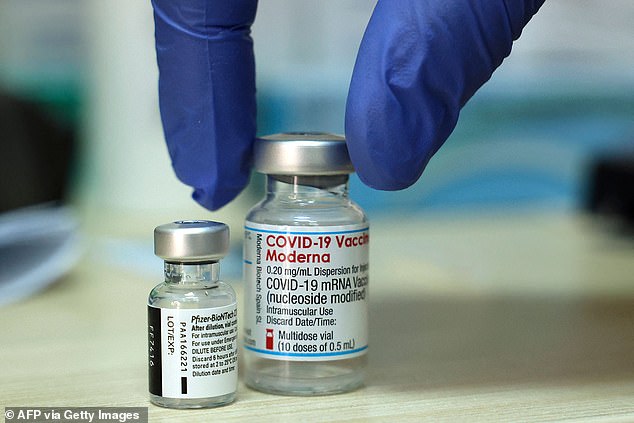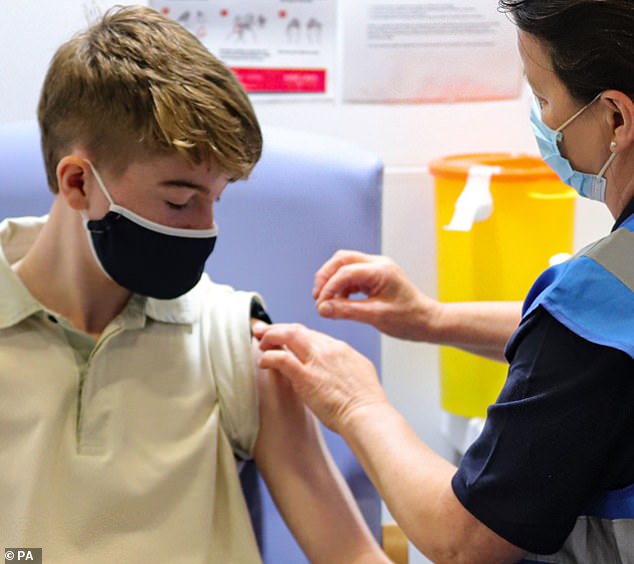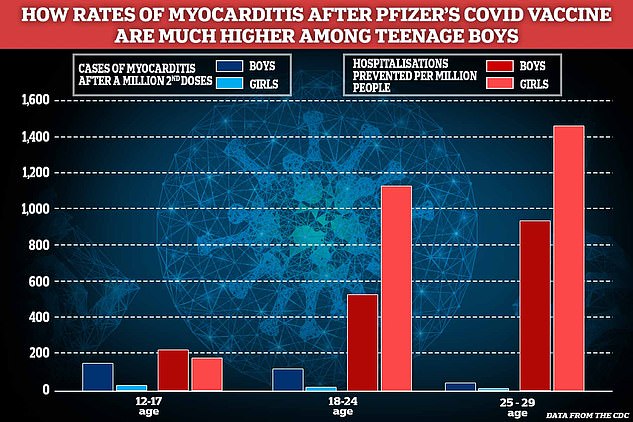Moderna’s Covid vaccine was today approved for all 12 to 17-year-olds, in a sign that Britain is edging closer to routinely jabbing children.
A review by the Medicines and Healthcare products Regulatory Agency (MHRA), the drug watchdog, found the jab was safe and effective in youngsters.
It becomes the second coronavirus vaccine to be approved for British children after Pfizer’s, which uses the same technology, was green-lit in June.
All 16 and 17-year-olds are already being invited for the Pfizer vaccine and don’t need permission from a parent or guardian to get one.
But only under-16s who live with vulnerable people or who have immune weaknesses themselves are being invited currently.
However, health chiefs last week hinted Britain may follow the US’ lead in vaccinating all children over 12. More than 10million under-18s in America have already had their first jab.
Moderna’s coronavirus vaccine is expected to be rolled out in the 12 to 17 age groups in similar fashion, unless guidance changes in the next few days.
The Department of Health has asked its inoculation advisory panel, which is separate from the MHRA, for a formal recommendation.
Both Moderna and Pfizer’s jabs have been linked to myocarditis, a rare heart problem believed to affect around one in 20,000 young people.
The Joint Committee on Vaccination and Immunisation (JCVI) has claimed the risk of heart inflammation still outweighs the benefit of Covid jabs for healthy under-16s.

Moderna ‘s Covid vaccine has been approved for children aged 12 to 17 by the UK’s medical watchdog

It becomes the second coronavirus vaccine to be approved for British children after Pfizer’s, which uses the same technology, was green-lit in June
The JCVI will look at Moderna’s trials of its Covid jab in children before making a recommendation.
The panel will likely look abroad to rollouts where the vaccine is already being given to children.
Dr June Raine, the chief executive of the MHRA, said: ‘I am pleased to confirm that that the Covid vaccine made by Moderna has now been authorised in 12-17 year olds. The vaccine is safe and effective in this age group.
‘We have in place a comprehensive safety surveillance strategy for monitoring the safety of all UK-approved Covid-19 vaccines and this surveillance will include the 12 to 17 year age group.
‘It is for the Joint Committee on Vaccination and Immunisation (JCVI) to advise on whether this age group should be vaccinated with the Covid vaccine made by Moderna as part of the deployment programme.’
All teenagers aged 16 and 17 in the UK are to be offered a coronavirus vaccine by next Monday (August 23) on the back of JCVI guidance.

Other countries have successfully been vaccinating younger children for some time, but the UK has taken a more cautious approach due to fears about myocarditis – a rare type of heart problem that has been noted in young people given mRNA vaccines, including Pfizer’s. The above chart shows the incidence of the condition in young adults and children given the Pfizer jab in the US. It reveals that teenage boys are 14 times more likely to suffer the problem compared to girls
What is myocarditis?
Myocarditis is an inflammation of the heart muscle. There are no specific causes of the condition but it is usually triggered by a virus.
Some of the most common infections which cause myocarditis, are those called adenovirus and Coxsackie B.
It can be caused by the common cold, hepatitis B and C, and herpes simplex virus.
The most common symptoms of the condition include chest pain, a fever, a fast heartbeat, tiredness and shortness of breath.
If the inflammation damages the heart muscle or the fibres that conduct electrical pulses to the heart, complications can develop.
They can develop quickly, and include sudden loss of consciousness, an abnormally fast, slow or irregular heartbeat.
In very severe cases the condition is fatal, causing heart failure or sudden death. The inflammation enlarges the heart and creates scar tissue, forcing it to work harder and therefore making it weaker.
In most cases of viral myocarditis, the illness goes away and there are no complications.
But in rare cases when inflammation is severe, there can be damage to the heart which needs monitoring and possibly a heart transplant.
Myocarditis can reoccur, but there is no known way to prevent this. The risk of recurrence is low, around 10 to 15 per cent, according to Myocarditis Foundation.
It is difficult to gauge the prevalence of myocarditis because there is no widely available test for it.
In 2010, approximately 400,000 people died of heart muscle disease – cardiomyopathy that includes myocarditis – worldwide.
Expert consensus opinion estimates that up to 40 per cent of dilated cardiomyopathy results from myocarditis, according to the National Organisation for Rare Disorders.
Advertisement
This will give them the opportunity to build up some level of protection before the school year starts in September, when infections are expected to rise sharply.
Other countries have successfully been vaccinating younger children for some time, but the UK has taken a more cautious approach.
So far the JCVI is only recommending the Pfizer vaccine be rolled out to children under 16 if they have severely weakened immune systems or learning difficulties.
Youngsters who live with immunosuppressed family members are also eligible for a jab.
The JCVI claims healthy children are at such a low risk from coronavirus and long Covid that the tiny risk of heart problems after vaccination outweighs the benefit.
Young people appear to be at a one in 20,000 chance of developing myocarditis, inflammation of the heart muscle, after a second dose of Pfizer’s vaccine.
Because Moderna and Pfizer’s vaccines both use the same mRNA technology, the risk is thought to be similar.
In guidance issues last month, the JCVI said the risk of a youngster dying from Covid was just one in a million.
The main benefit of vaccinating children is to protect older adults, which has made the move somewhat controversial.
A spokesperson for the department said: ‘We welcome the news that Moderna’s vaccine has been approved as safe and effective for people aged 12 and over.
‘As has been the case with all other approvals, we will now be guided by the independent Joint Committee on Vaccination and Immunisation (JCVI) and have asked for its formal recommendation on whether to administer this vaccine to people aged 12 to 17.
‘All young people aged 16 to 17, clinically vulnerable children aged 12 to 15 and people who live with adults who are immunosuppressed will be offered a first dose of a Pfizer jab by Monday 23 August.’
Originally, the JCVI said in July that the Pfizer vaccine should not routinely be given to 16 and 17-year-olds.
But it U-turned earlier this month because of a rise in the number of infected teenagers getting seriously ill with the Delta variant.
NHS data shows around 20 Covid-infected children aged between six and 17 are being admitted to hospital every day currently.
For comparison, the rate was in single figures until the start of July, when the third wave began to spiral rapidly. There were two days in May where no youngsters were hospitalised.
The tiny numbers of children who become seriously ill is the main argument used by critics of No10’s decision to expand the roll-out to youngsters.
Data also suggests around one in 15,000 teenage boys given Pfizer’s jab will develop myocarditis — which can lead to heart failure.
It has raised concerns about the risk-benefit ratio for children, especially boys, who may be up to 14 times more likely to be struck down with the complication.
But other scientists agree with the UK’s move to vaccinate children, saying cases of the condition appear to usually be mild.
Any increase in prevalence tips the risk-benefit balance in favour of jabs because the dangers posed by Covid are skewed higher.
Professor Finn, a paediatrician at Bristol University, said while most young people will only have the virus in a mild form, the vaccines will be effective at preventing serious cases.
WHAT ARE THE PROS AND CONS OF VACCINATING CHILDREN?
Pros
Protecting adults
The main argument in favour of vaccinating children is in order to prevent them keeping the virus in circulation long enough for it to transmit back to adults.
Experts fear that unvaccinated children returning to classrooms in September could lead to a boom in cases among people in the age group, just as immunity from jabs dished out to older generations earlier in the year begins to wane.
This could trigger another wave of the virus if left unchecked, with infection levels triggering more hospitalisations and deaths than seen during the summer.
Avoiding long Covid in children
While the risk of serious infection from Covid remains low in most children, scientists are still unsure of the long-term effects the virus may have on them.
Concerns have been raised in particular about the incidence of long Covid — the little understood condition when symptoms persist for many more weeks than normal — in youngsters.
A study released last night by King’s College London showed fewer than two per cent of children who develop Covid symptoms continue to suffer with them for more than eight weeks.
Just 25 of the 1,734 children studied — 0.01 per cent — suffered symptoms for longer than a year.
Cons
Health risks
Extremely rare incidences of a rare heart condition have been linked to the Pfizer vaccine in youngsters.
Data from the Centers for Disease Control and Protection (CDC) in the US — where 9million 12- to 17-year-olds have already been vaccinated — shows there is around a one in 14,500 to 18,000 chance of boys in the age group developing myocarditis after having their second vaccine dose.
This is vanishingly small. For comparison, the chance of finding a four-leaf clover is one in 10,000, and the chance of a woman having triplets is one in 4,478.
The risk is higher than in 18- to 24-year-olds (one in 18,000 to 22,000), 25- to 29-year-olds (one in 56,000 to 67,000) and people aged 30 and above (one in 250,000 to 333,000). But, again, this is very low.
Britain’s drug regulator the MHRA lists the rare heart condition as a very rare side-effect of the Pfizer and Moderna vaccines.
They said: ‘There have been very rare reports of myocarditis and pericarditis (the medical term for the condition) occurring after vaccination. These are typically mild cases and individuals tend to recover within a short time following standard treatment and rest.’
More than four times as many hospitalisations were prevented as there were cases of myocarditis caused by the vaccine in 12- to 17-year-olds, the health body’s data show.
Jabs should be given to other countries
Experts have also claimed it would be better to donate jabs intended for teenagers in the UK to other countries where huge swathes of the vulnerable population remain unvaccinated.
Not only would this be a moral move but it is in the UK’s own interest because the virus will remain a threat to Britain as long as it is rampant anywhere in the world.
Most countries across the globe are lagging significantly behind the UK in terms of their vaccine rollout, with countries in Africa, Southeast Asia and South America remaining particularly vulnerable.
Jabs could be better used vaccinating older people in those countries, and thus preventing the virus from continuing to circulate globally and mutate further, than the marginal gains to transmission Britain would see if children are vaccinated, experts argue.
Professor David Livermore, from the University of East Anglia, has said: ‘Limited vaccine supplies would be far better used in countries and regions with large vulnerable elderly populations who presently remain unvaccinated — Australia, much of South East Asia and Latin America, as well as Africa.’
Advertisement
Source link : https://www.dailymail.co.uk/news/article-9901121/UK-approves-Modernas-Covid-jab-12-17-year-olds.html











